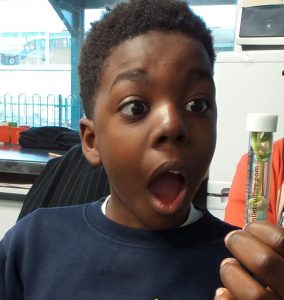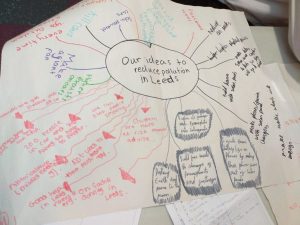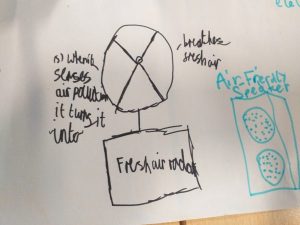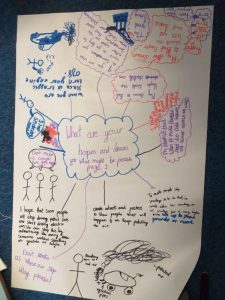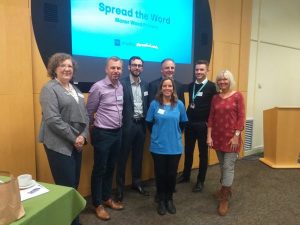Training Generation Z
Friday 28th February 2020
Share this entry:
‘Humans are very adaptable: we can still fix this. But the opportunity to do so will not last for long. We must start today.’ Greta Thunberg, aged 16, April 2019
At IVE we are responding directly to requests from young people to find creative solutions to real world challenges – with one of the most pressing right now being climate change. We have developed the Applied Creativity Lab model in response, designed to empower young people to come up with their own creative and often STEM-related solutions. This term we have been focusing on finding new ways to reduce air pollution in Leeds with pupils in John Smeaton Academy, Mount St Mary’s Catholic High School and Manor Wood Primary.
At IVE we believe that human creativity generates the ideas that drive innovation.
We believe that innovative ideas come from creative mind-sets and that creative mind-sets and young entrepreneurs can be cultivated by following a process, which put simply includes:
- Clarifying the task
- Thinking divergently for ideas
- Choosing an idea to develop
- Thinking convergently to plan
- Doing it in practice
- Refining it to improve it
- Presenting it to an audience
- Reviewing the process
As we worked with young people on the Ideation stage of our Applied Creativity Lab on Air Pollution this term, we reflected on the different aspects of cultivating creative mind-sets and asked ourselves these additional questions:
- How do we best enable young people to develop their ideas?
- How do we ensure high motivation to find new solutions?
- How does the group environment individuals are working in affect their capacity for ideas development? What does this look and feel like?
- How can we support individuals and groups to talk, listen to each other and work together to develop their ideas and ways to communicate them to others?
- How do we frame the challenge, keep individuals focused and encourage persistence when they hit idea blocks?
By trialing the Applied Creativity Lab in 3 different ways:
- with a specific teacher-selected initial cohort of 30
- with a self-selecting/teacher-picked cohort of 12
- with two whole existing classes of 30
We learned more about what works best. It has been a fascinating learning journey for all involved. The imperative to hone the labs and find a foolproof way that works every time is strong.
‘Never before has the need for creative thinking and innovative ideas been more pressing – for ideas to emerge that can help solve the real world people-driven challenges of industrialization, pollution, carbon emissions, reliance on single-use plastics etc – if we are to stand a chance of alleviating the climate crisis we are now faced with.’
https://weareive.org/knowledge-is-not-enough-when-it-comes-to-life-on-earth/
We already know that finding young people who are interested in the subject matter and who like inventing new ideas is a winning combination. We can see that providing an environment in which they are able to really listen to each other, respect each other and take an interest in each other’s ideas is vital. Class and noise level management is proving to be a crucial factor – especially when we are coming in from the outside as relative newcomers.
Knowing and applying school rules for getting young people to stop, listen and focus and getting teacher support for that too during the session is key –especially when they are all eagerly and excitedly engaged in the creativity training activities.
Vital in-kind support from Leeds City Council, the University of Leeds, Magpie Creative Agency, Bradford Teaching Hospitals Foundation Trust, Sustrans & Mott MacDonald who all delivered expert support to the young people has been a vital and inspiring element of the lab that has placed the exercise in real-time with an added careers value.
During the Ideation phase – where we have been supporting young people with ideas development – we noticed the ease and speed with which primary children in particular came up with ideas – ratifying George Land’s provocation that creativity is un-learned as children head through childhood into adulthood.
One teacher commented:
‘After a fantastic introductory whole year group session last week, both myself and the children were incredibly excited to start thinking of ideas to promote clean air today. Before the project began, I naturally thought about different children of varying abilities and wondered who would be fully engaged with the project. What I have noticed in this session is that ALL children were fully engaged in the sharing of ideas. It was fantastic to see children who can be quieter in group situations share their ideas and really start to think about what could be possible (no limits).
It was refreshing to observe the children grab the opportunity of being creative thinkers. So often at school they are bound by structured lessons and before embarking on long writes, we give them model texts and guide them through a series of activities. Thank you ever so much.’
Manor Wood Primary teacher.
We supported and observed young people throughout the Ideation phase, and watched with interest to see how they rose to the ultimate challenge of arriving at their final ideas, how they developed their concepts and then planned to present them to the Industry Panel at the pitch event on 28th November at Leeds Town Hall made possible with support from Leeds City Council. The Industry Panel included representatives from Leeds City Council, Leeds Climate Commission, Siemens, ENGIE & Mott MacDonald.
They all really enjoyed the presentations and after much deliberation selected a few ideas to be taken on the next stage of development – including an online game, an app, an air purifier, an eco-bike and a green wall idea! Evaluation of impact on pupils and teacher evaluations are being analyzed and report is due in January detailing the impact of this, our very first Applied Creativity Lab. Young people from all three schools have asked if they can do it again! In the meantime, learning from this first ACL on air pollution – #breatheLeeds – is being applied to the development and delivery of next term’s ACL on Food Sustainability!
For more information or how to get involved with IVE’s Applied Creativity Labs, please contact Sarah Mumford at : sarah@weareive.org
IVE’s Deputy Chief Executive, Drew Rowlands will be speaking at Childcare & Education Expo London on Saturday 21st March 2020. Register for Free and book your seminar tickets here.
Original blog written by Sarah Mumford, reposted with permission from https://weareive.org/creative-solutions-to-real-world-problems-training-generation-z/. Images all IVE.
Why attend Childcare & Education Expo?
Join over 2,500 like-minded individuals from the early years & primary sector who are dedicated to improving their practice and their education settings.
Attend educational seminars to credit your CPD
Meet the experts to have your questions answered
Receive fantastic onsite offers and discounts
Experience expert-led informative hands-on workshops
Network with peers and industry players
Pick up hundreds of new products, resources, ideas and services
And most of all, enjoy a great day out with your colleagues


